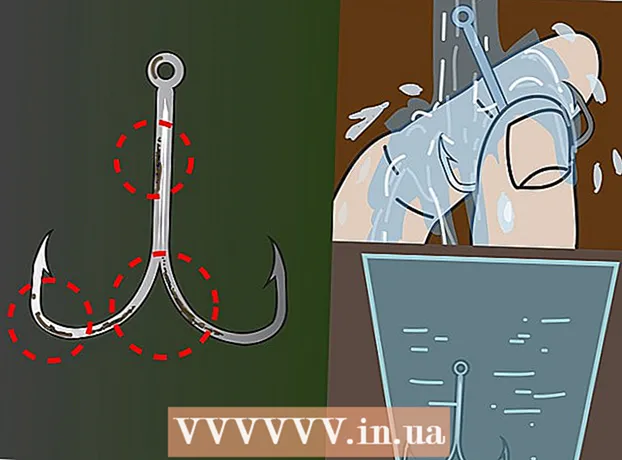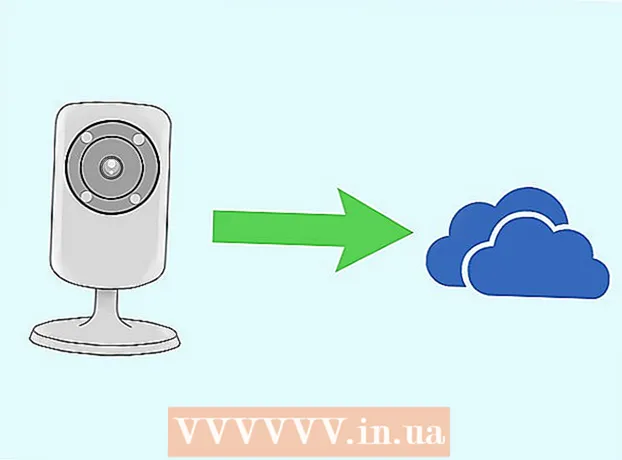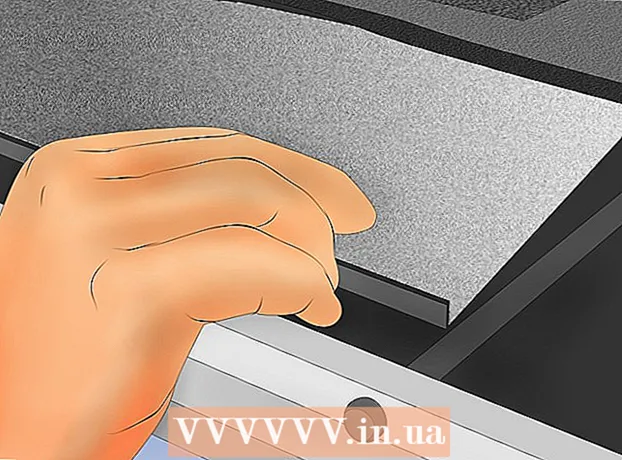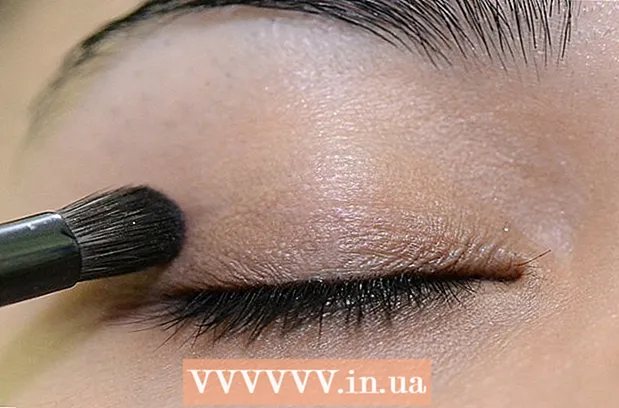Author:
Joan Hall
Date Of Creation:
25 July 2021
Update Date:
1 July 2024

Content
1 Keep the coin under warm water. A stream of warm tap water can remove the top layer of dirt. You do not need any additional devices, the pressure of water from the tap will be quite enough. Run the coin under running water for a couple of minutes. Then place the coins on a paper towel or cloth.- All coins can be cleaned with water, but copper coins react with more substances than nickel or silver coins, so more dirt accumulates on them. This makes it difficult to clean these coins with water.
- Before cleaning the coins, be sure to plug the stopper over the sink to prevent them from falling into the drain if they accidentally slip out of your hands.
- Clean the coins one at a time so that a jet of water hits each coin.
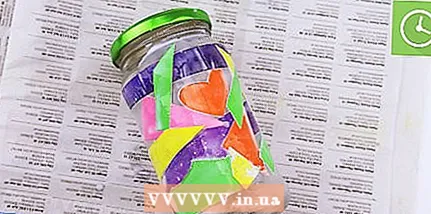 2 Place the coins in a solution of water and dishwashing detergent. Make the solution in a small bowl using warm water and dishwashing liquid, and then dip the coins into the solution one at a time. Pinch the coin between your thumb and forefinger, then gently wipe off any plaque from both sides of the coin. It will become cleaner before your very eyes.
2 Place the coins in a solution of water and dishwashing detergent. Make the solution in a small bowl using warm water and dishwashing liquid, and then dip the coins into the solution one at a time. Pinch the coin between your thumb and forefinger, then gently wipe off any plaque from both sides of the coin. It will become cleaner before your very eyes. - Heavily soiled coins can be left in the solution for a while.
- Non-abrasive liquid solvents, consisting of distilled water and a mild detergent, have sufficient cleaning power to remove dirt from coins and do not contain acids that can damage metal.
 3 Scrub the coins with a soft toothbrush or paper towel. Scrub the coins with a brush while they are in the soapy solution. Clean until the sides of the coin are shiny again. Wash the coin frequently in water to avoid visible scratches. This cleaning method can damage valuable or antique coins and reduce their value.
3 Scrub the coins with a soft toothbrush or paper towel. Scrub the coins with a brush while they are in the soapy solution. Clean until the sides of the coin are shiny again. Wash the coin frequently in water to avoid visible scratches. This cleaning method can damage valuable or antique coins and reduce their value. - After brushing, coins should be rinsed thoroughly.
- Don't rub the coin too hard. Focus on a small area and work with gentle strokes.
 4 Dry the coins with a towel. Wipe each coin with a towel and place them in a dry place. There should be no moisture on the coins, otherwise they will start to deteriorate over time. Your coins now look like new again.
4 Dry the coins with a towel. Wipe each coin with a towel and place them in a dry place. There should be no moisture on the coins, otherwise they will start to deteriorate over time. Your coins now look like new again. - It is best to use a non-cotton cloth to remove the liquid.
- Simply dabbing coins with a cloth or towel will prevent micro-scratches.
Method 2 of 3: Soaking the coins
 1 Make a cleanser using isopropyl alcohol and salt. These chemicals are abrasive and acidic to remove any dirt. To create a solution, add two tablespoons of table salt to a glass of over-the-counter isopropyl alcohol. Stir the solution and place coins in it. Leave the coins in the solution for two hours to a week, depending on how dirty they are.
1 Make a cleanser using isopropyl alcohol and salt. These chemicals are abrasive and acidic to remove any dirt. To create a solution, add two tablespoons of table salt to a glass of over-the-counter isopropyl alcohol. Stir the solution and place coins in it. Leave the coins in the solution for two hours to a week, depending on how dirty they are. - Isopropyl alcohol is a versatile solvent that can deal with compounds that ordinary water cannot do (for example, non-polar compounds).
- Isopropyl alcohol has a strong odor and is highly flammable. Be sure to open the windows before mixing the solution and soaking the coins.
 2 Rinse the coins with distilled water. Tap water contains chlorine, which will gradually erode coins. It is best to use distilled water for rinsing to completely remove all chemicals.
2 Rinse the coins with distilled water. Tap water contains chlorine, which will gradually erode coins. It is best to use distilled water for rinsing to completely remove all chemicals. - Distilled water is water that has been purified from all contaminants.
- You can buy distilled water at any supermarket.
 3 Blot the coins with a cloth and air dry. Flip the coins and repeat the steps. Do not fold coins immediately after drying to keep moisture away. Any remaining moisture will have a negative effect on the coin.
3 Blot the coins with a cloth and air dry. Flip the coins and repeat the steps. Do not fold coins immediately after drying to keep moisture away. Any remaining moisture will have a negative effect on the coin. - Exposure to extreme temperatures degrades the patina of coins. Do not use heated air for drying.
- If, after getting wet, traces of cotton or dust remain on the coin, then they should be blown away without using compressed air.
 4 Store coins at room temperature in acid-free plastic folders. Common storage materials such as paper, cardboard and some types of plastics can damage the surface of coins. Do not use containers containing polyvinyl chloride (PVC) as they are dangerous for coins. Extreme temperatures are also negative, so it is best to store coins at room temperature and low humidity.
4 Store coins at room temperature in acid-free plastic folders. Common storage materials such as paper, cardboard and some types of plastics can damage the surface of coins. Do not use containers containing polyvinyl chloride (PVC) as they are dangerous for coins. Extreme temperatures are also negative, so it is best to store coins at room temperature and low humidity. - Do not store coins where they can fall (high, wobbly shelves).
- For demonstration of coins, you can use a folder for two pockets, made of lavsan (special polyester for storing coins).
Method 3 of 3: Cleaning Collectible Coins
 1 See a professional. Be sure to consult a professional appraiser before cleaning collectible coins. Cleaning collectible coins can significantly reduce their value; sometimes “toning” or discoloration of the coin and patina on exposure to air can increase the overall value. So it's best not to clean up valuable or antique coins.
1 See a professional. Be sure to consult a professional appraiser before cleaning collectible coins. Cleaning collectible coins can significantly reduce their value; sometimes “toning” or discoloration of the coin and patina on exposure to air can increase the overall value. So it's best not to clean up valuable or antique coins. - When handling antique coins, always hold them by the edge, not the flat sides. Grease and fingerprints can negatively affect sample cost.
- There is a standard classification of the condition of coins, so even the smallest scratch from wiping can greatly reduce the value of a coin.
 2 Apply a thin layer of Vaseline using a cotton swab. Take a special lint-free cloth and lightly blot the coin until the Vaseline is completely removed. This will remove some of the dirt and dust without damaging the coin. Proceed with caution using a magnifying glass.
2 Apply a thin layer of Vaseline using a cotton swab. Take a special lint-free cloth and lightly blot the coin until the Vaseline is completely removed. This will remove some of the dirt and dust without damaging the coin. Proceed with caution using a magnifying glass. - You can apply Vaseline with a cotton swab or a very soft, non-synthetic brush.
- Do not use an excessive amount of Vaseline, a very thin layer will suffice.
 3 Place the coin in acetone for 5 seconds. If acetone remains on the coin, it will give it a brown haze, which will significantly reduce its value. It is very important to immediately rinse the coin in distilled water and completely remove the acetone before drying. Don't rub antique coins.Acetone, which is a solvent and not an acid, will not affect the value of the coin in any way if it is not exposed to it for an extended amount of time.
3 Place the coin in acetone for 5 seconds. If acetone remains on the coin, it will give it a brown haze, which will significantly reduce its value. It is very important to immediately rinse the coin in distilled water and completely remove the acetone before drying. Don't rub antique coins.Acetone, which is a solvent and not an acid, will not affect the value of the coin in any way if it is not exposed to it for an extended amount of time. - Acetone is highly flammable. When working, use rubber gloves without powder.
- When using a jug of distilled water, cover the inside with a napkin to prevent the coin from scratching on the inside of the jug.
- Use 100% acetone. Other products containing acetone also contain other substances that can damage the coin and reduce its value.
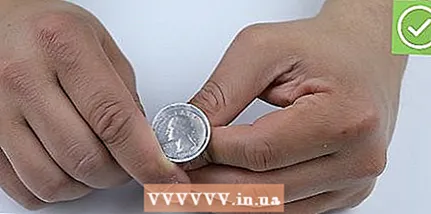 4 Store collectible coins in special 2x2 hard plastic folders. These folders can be folded into a special binder so that you can view all the coins. Hard plastic is more reliable and able to protect coins from damage. The main thing is that your folders are airtight and that your coins are not exposed to the environment.
4 Store collectible coins in special 2x2 hard plastic folders. These folders can be folded into a special binder so that you can view all the coins. Hard plastic is more reliable and able to protect coins from damage. The main thing is that your folders are airtight and that your coins are not exposed to the environment. - Do not use plastic containing PVC. Use lavsan folders, as PVC is harmful to coins with prolonged contact.
- Store antique coins away from staples and other metal elements.
- Don't use paper. It contains sulfur, which gives the coins a dark shade.
Tips
- Hold the coin by the edge. If you hold the coin by the face, the natural oils on the surface of the fingers will slowly break down.
- Use a soft towel to avoid damaging the coins if they suddenly slip out of your hands.
Similar articles
- How to make a silver coin ring
- How to clean coins
- How to collect coins
